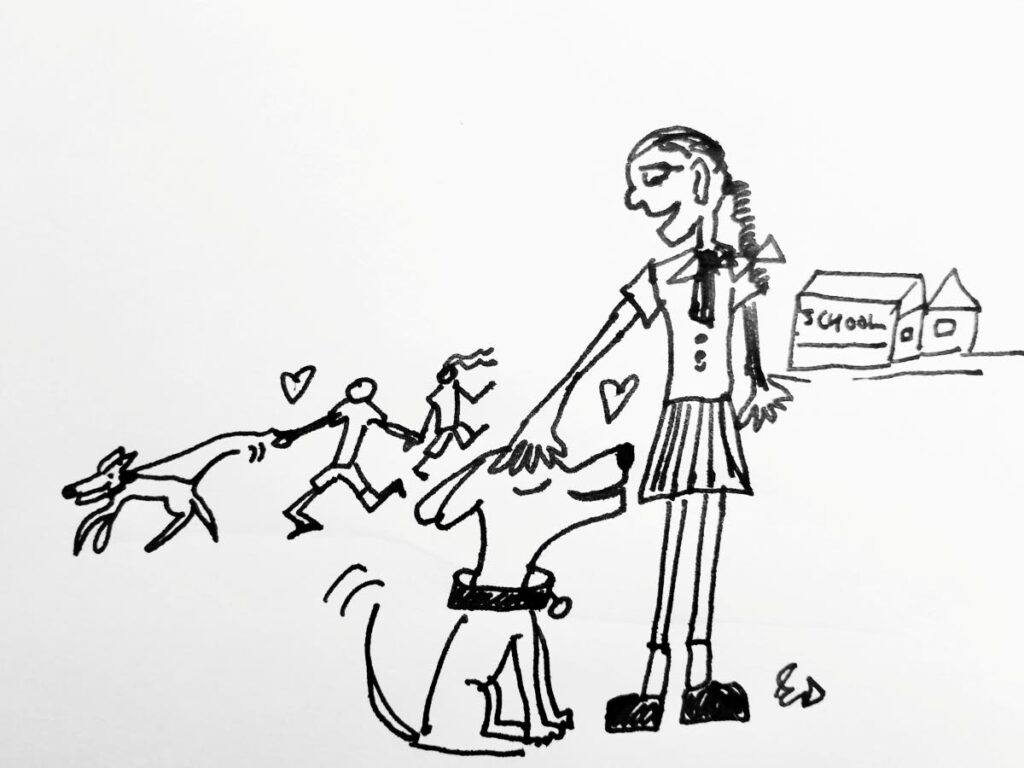Enhance students' emotional well-being with 'school dogs'

RECENTLY, I saw a Facebook story appealing for help to save a "school dog," Blackie.
It was posted by a student, who expressed concern that authorities were trying to catch Blackie, possibly with not very humane intentions in mind.
She wrote: "This dog has been at the school before we even started school. She has kept us company during our first year in school. She doesn't cause trouble in the school, she doesn't even poop all over or anything. She walks with the students when we go for a taxi, making sure we good and she chills with the security."
She lamented that management was trying to remove Blackie because of an upcoming graduation ceremony that the President was due to attend. Allegedly, the institution did not want "strays" around during Her Excellency's visit.
"This dog is a mascot and should be taken care of by the school," the student wrote. "She looks out for us..."
On reading her words, one of my first thoughts was "What if the Honourable Christine Kangaloo is an animal lover?"
If so, she might have been delighted to meet Blackie upon arrival.
On the website of the Office of the President, the presidential bio states (in part): "In Ms Kangaloo’s first ministerial position, as Minister in the Office of the Prime Minister with responsibility for Social Services Delivery, Ms Kangaloo acquired an in-depth knowledge and awareness of the needs of vulnerable, disenfranchised, marginalised and disadvantaged persons, and sought to become a voice for these persons."
I imagine that a woman with such a background and interest might understand that many who are "vulnerable, disenfranchised, marginalised and disadvantaged" are also of the animal kind – Blackie being one case in point.
The About Us section of the website of the Port of Spain branch of the TT Society for the Prevention of Cruelty to Animals (TTSPCA) says: "Up until TT became a republic, successive governors/governor generals were the patrons of the society. Since 1976 the presidents of the twin-island republic have assumed sponsorship of the society."

If still the case, this means that Her Excellency is likely the current patron of the TTSPCA...certainly not someone for whom an apparently much-loved "school dog" should be removed.
Various people, myself included, sought a solution for Blackie by sharing the Facebook post, resulting in a wave of voices (including some well-known ones, like designer Brian McFarlane) speaking up on behalf of the dog:
"Save her."
"Do not remove her."
"Write and appeal directly to the President."
"Contact the school's authorities." And so on.
In the end, "animal rescuer" Komal Ramcharitar made the trek down south to collect Blackie, with intentions of taking her to safety until a solution could be found (eg adoption, or acceptance at the school). However, on her arrival, Komal was informed Blackie was not wanted and should not be returned.
The former "school mascot" was taken to a veterinary clinic for spaying and check-ups. Reportedly, she is a friendly older dog (approximately seven years old) who "smiles" often, apparently even on command.
Hopes are that she will be adopted into a loving home. Any takers?
In my secondary-school days, there was a brindle-coated dog who appeared one day on the school compound and stayed. Two classmates and I named her Harriet. Feeding and playing with her was the highlight of our existence during every break and lunchtime. I cannot recall what eventually became of her – but one day she was no more.
The sudden disappearance of "school animals" can be distressing for students who love them.
Rather than being seen as problems, stray animals that move into institutions can be seen as "Ambassadors of Unconditional Love," worthy of having around for supervised, therapeutic purposes.
Instead of shuttling strays into shelters, build spacious at-school kennels and dog runs for socialised street canines. Have specified, supervised dog-and-student playtimes. Let students learn responsibility and discipline by tending to the dogs.
"Interacting with dogs helps children create healthy bonds and develop emotional tools to decrease conflict and bullying in the classroom." (Observatory)
In 2017, a pilot programme entitled Respect Me was launched in Spain. It consisted of animal-assisted education to combat bullying.
"In this space, assisted therapies with dogs are managed, having as their primary objectives to promote respect, prevent bullying, and strengthen inclusion among students." (Observatory)
Food for thought, Trinidad and Tobago.

Comments
"Enhance students’ emotional well-being with ‘school dogs’"